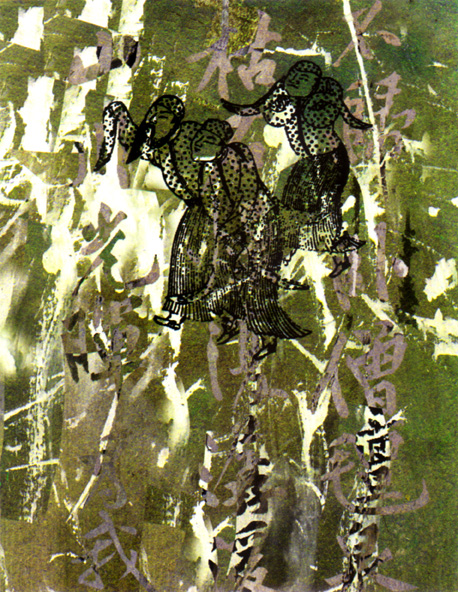 PREVIOUS PAGE:
LI SHANGYIN 李商隱
“此情可待成追憶,祇是當時已惘然!”
"A sensation to be enjoyed in the future... / but by then all will be vacuous and dreary."
UNG VAI MENG 吳衛鳴 WU WEIMING
1995. Assemblage.
PREVIOUS PAGE:
LI SHANGYIN 李商隱
“此情可待成追憶,祇是當時已惘然!”
"A sensation to be enjoyed in the future... / but by then all will be vacuous and dreary."
UNG VAI MENG 吳衛鳴 WU WEIMING
1995. Assemblage.
Although Macao has strong connections with the works of such eminent poets as Luís de Camões, Camilo Pessanha Wu Li, · Wei Yuan, · and others, the prevailing notion remains that the territory is not the shelter of a 'poetical world.' The social-cultural evolution of the last two decades has been contributing towards the abandonment of such notion. In fact, during the last twenty years Macao has seen the flowering of a great number of talented poets, both Chinese and Portuguese. This short essay will deal exclusively with the Chinese language poets of Macao, the works of most of them not even being known by the Portuguese living in the territory.
The extraordinary surge in Macao of Chinese speaking poets during the last twenty years is due to the following factors:
1. The high emigration of Chinese speaking families from both mainland China and other southeast Asian countries to Macao during the 1970s and 1980s; many of these families with an intellectual background;
2. The generalization of higher levels of education in Macao, as a result of economic expansion. The generous increase of native students in local or foreign higher education, thus in contact with more heterogenous cultures. In fact, most of the best contemporary Chinese speaking poets living in Macao are quite young still post-graduate students or university graduates.
3. The strong poetical vocation of many youngsters, strongly influenced by the dynamism of poets from previous generations. The Macao association of poets known as May Poetry Society· is also an active nucleus for the exchange of ideas, frequently organising conferences and debates, and sporadically publishing a poetry bulletin called "Modern Macanese Poetry Review".· Also, some Chinese language dailies such as "Macao Daily" and "Overseas People Chinese Journal",· regularly include a weekly literary page exclusively reviewing and publishing prose and poetry works. Many poems by local residents have been published in the last few years, greatly stimulating the poetic creativity of the readers.
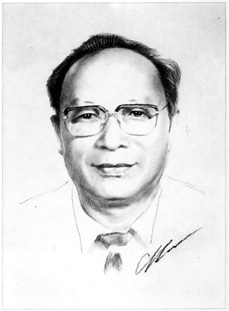 TAO KONG LIAO 淘空了
LEI CHI NGOK 李志岳 LI ZHIYUE
1995. Pencil on paper. 21.4 cm x 15.8 cm.
TAO KONG LIAO 淘空了
LEI CHI NGOK 李志岳 LI ZHIYUE
1995. Pencil on paper. 21.4 cm x 15.8 cm.
Because of the different educational and environmental backgrounds of the contemporary Chinese speaking poets living in Macao, their poetical production is heterogeneous, not following a generic style or complying with a common subject. Notwithstanding these differences their output may be broadly classified under three groups: 'traditional', 'modern' and 'young'.
The word 'traditional' is here to be understood with two meanings. First, 'traditional' are those poets which strictly comply with the prescribed rules of Chinese classical poetry with their categorical notions of, for instance, precise rhyme, the metric of the characters in the verses, etc. But 'traditional' are also those poets who, despite composing without adhering to the classic prosaic canons, nonetheless express in their poems a traditional evocative spirit. These 'traditionalists' show close creative links with the Chinese "New Poetry" movement of the 1920s, a decade when many young poets liberalized Chinese poetry from its canonical rules injecting it with fresh ideas and novel compositional structures. The most representative Chinese speaking poets living in Macao which may be classified under this group are Hu Xiaofeng·, Yun Duhe·, Wang Haohan·, and Jiang Siyang· who in spite of being predominantly influenced by classical Chinese poetry, reveal great expertise in achieving a harmonious balance between suggestive ness and imagery, and between the rhythm of the poems and the diction of the characters.
Yun Duhe, · who suffered great vississitudes in life, reveals his deep knowledge of the rules of 'traditional' poetry which he strictly applies to his own. His poetry may be metaphorically compared to a prisioner 'dancing in iron shackles'· due to the extreme difficulty in reconciling poetical meaning and the prosaic structure strictly complying with 'traditional' canons. The poet achieved a versatile compromise, avoiding some conditionings in favour of a refined elegance. His 'modern' poems are characterized by a melancholic lyricism. His poems attempt to express that a poets' existence is a compound of great sorrows and joys and that the duty of a 'true' poet is to proclaim the invincible strength of Man's individualism.
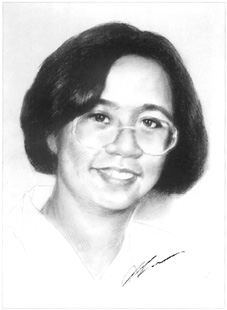 YI LING 懿靈
LEI CHI NGOK 李志岳 LI ZHIYUE
1995. Pencil on paper. 21.4 cm x 15.8 cm.
YI LING 懿靈
LEI CHI NGOK 李志岳 LI ZHIYUE
1995. Pencil on paper. 21.4 cm x 15.8 cm.
Wang Haohan· is a poet deeply affected by the spirituality of Chinese 'traditional' poetry. His poems express with a great degree of freedom and well articulated characters a realm full of sensibility, subtlety and tenderness.
WANG HAOHAN 汪浩翰
人在秋山撿拾秋的落果
秋水畔偶遇浴後的月亮
誰家的院落菊花開過了
落英洒落在黃昏的餐盤
"Gathering fallen fruits on the autumn mountain,
A moonlight encounter by the water's edge.
Whose garden is this where the crysanthemums have withered?
Falling petals sprinkle the table at dusk."
The poet shows full knowledge of the Tang and Song poetical styles. His description of a placid autumnal scene mechanically complies with the correct, rigorously determined canonical structures. Present Chinese critics highly praise the work of this poet who is considered to be one of the best contemporary poets composing in the 'traditional' classicism.
Yu Xiaofeng, an older yet but dynamic poet, composes using techniques that comply with 'traditional' rules as well as giving free reign to 'modern' structures. After many years spent abroad and then returning to China he finally setled in Macao. His nomadic lifestyle strongly influenced his poems. In the following poem he expresses melancholy for the passing of time in verses steeped with the ever-enduring reminiscences of the great classic Chinese themes.
HU XIAOFENG 胡曉風
你把脂痕留給楓葉
我借蘆花點綴鬢邊
雁箏不響
昨宵殘夢不溫
"Smears of your rouge on the maple leaves;
I adorn your hair with catkins.
Duck and zither are silent now;
Last night's dream has faded."
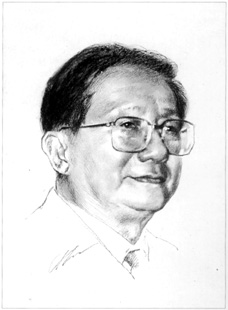 TAO LI 陶里
LEI CHI NGOK 李志岳 LI ZHIYUE
1995. Pencil on paper. 21.4 cm x 15.8 cm.
TAO LI 陶里
LEI CHI NGOK 李志岳 LI ZHIYUE
1995. Pencil on paper. 21.4 cm x 15.8 cm.
The 'modern' group is certainly the best represented in present-day Macao poetry. To this group belong a fair number of poets which arrived from mainland China and southeast Asian countries during the 1970s and 1980s permanently settling in Macao. These poets were pivotal for the great increase and activity of Chinese poetry in the territory. Their work repeatedly searches for the conscious recognition of the values of Man as an individual, revealing a reflection and intervention in opposition to the more materialistic and absurd values of contemporary society, looking back at the disturbing evolution of history and thinking ahead about the uncertainties of the future. In their poems, reflection and intervention are frequently mixed with anguish, perplexity and irony. There is a feeling that these poets collectively aim at expressing an inner world, attempting to explicit subjective emotions frequently with a tamed lyricism but sometimes with a more daring 'modernism'. There is a deliberate rejection of a prosaic Realism and Romantism exhaustively reformulated in twentieth century Chinese literature in favour of more expressive formulas capable of sensitively conveying to the reader the inner and outer worlds of the poet. Tao Li, · a leading spokesman of this group once expressed its idealism declaring: "The form chosen is that of formlessness, the intention being to convey the entire experience of the senses, as reflected by the poet's individuality and inner feelings."
Tao Li has lived an intensely poetical life. Born in Guangdong, he emigrated together with his family to Vietnam when he was seven. Compelled to leave, he returned to China, moving to Hong Kong not long after and finally settling in Macao. His nomadic existence, a traditional Chinese upbringing and the strong influence of French poetry made him an extraordinary personality. His transient past impregnated him with a lifetime difficulty to feel 'at home' in any land. Being Chinese at heart, he cannot detach himself from being affected by the present unstable reality shaped by the vicissitudes of the present. Being an intellectual, anxious to be true to himself and the others, he cannot cease from in tensely sharing his innermost feelings and thoughts.
As a man equally enraptured by the love of 'traditional' and 'modern' poetry, he is an experimentalist by nature. His brilliant capacity to imagine, his innovative approach and his prolific output have been a constant source of inspiration for local Chinese speaking poets living in Macao.
TAO LI 陶里
風與我一起飄泊
想起墜馬受傷的日子
南方在陽光 依舊燦爛
雲彩在你鬢邊飄過
記憶凝成大理石
在我的放蕩腦海 竪起一鏡星海
"Wandering with the wind,
I recall the pain of a childhood horse fall.
The sunlight still gleaming to the south,
The patterned clouds in the wind behind you.
Memories hard as Yunnan marble construct
mirrors of the starry sea in my muddled head."
Another outstanding poet of the 'modern' group is Gao Ge. · A reputed art critic and greatly versed in Chinese history and culture, his poetical experience attempts to be a breakthrough in "creating a brand new surreal world".
His poetry is tinged by a melancholic and lyrical flow reinforced by strong imagery eventually blended to a sarcastic appreciation of the surrounding world.
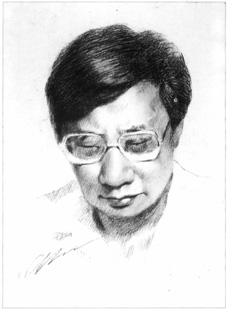
GAO GE 高戈
LEI CHI NGOK 李志岳 LI ZHIYUE
1995. Pencil on paper. 21.4 cm x 15.8 cm.
GAO GE 高戈
你從很遠很遠望我
我掀起所有的波浪
那燒灼黑暗的波浪
接受你的顫抖
你昇上冰冷的幽穹
在失掉太陽的窗口
沉靜地俯視我
仍然很遠很遠
我的波濤已化為一泓慘白
我到底投入了我的深處
在那兒冰冷地澆灼
你涓潔的光影
"You gaze at me from far, far away.
I set all the waves rolling;
Those waves scorch the blackness,
Resonating as you tremble.
You rise above the icy heavens
To a window beyond even the sun.
Looking down serenely,
Still from far, far away.
My waves are already deep and pale,
You have probed deep within me,
Icily scorching
The clean stream of your shadows."
Also deserving a mention is another poet whose pseudonym is Tao Kong Liao. · He emigrated to Macao in the 1970s where he, at first, found great difficulties to survive. Initially working as a night porter and then as a construction worker he jumped "out of life's crevice",· to become a poet whose compositions he admits go beyond his aspirations. His work reveals an extreme modernity which is a conscious caesura with the 'traditional'. His poems deconstruct the linguistic syntax and logic of the verses' structure in order to present the reader with particularly novel interpretations. His poetry is full of surprises.
Other important names which belong to the 'modern' group are Han Mu, · Yu Wen, · Liu Xing Zi, · and Wu Guo Chang· who is a dynamic deputy at the Legislative Assembly of Macao.
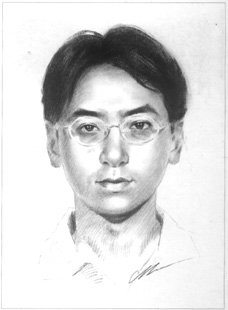
WEI MING 葦嗚
LEI CHI NGOK 李志岳 LI ZHIYUE
1995. Pencil on paper. 21.4 cm x 15.8 cm.
The 'new' group are assertively positive and optimistic about the future development of Chinese poetry. This young generation of poets is greatly active in Macao. Their works express a more outspoken criticism about present-day society. The reflective facets of their poetry are critical and analytical, voicing what they feel to be "a real necessity"· to manifest their feelings. Wei Ming, · a talented young poet of fine virtues and courageous attitudes, exhibits in his sharp, incisive and satirical poems an unusual frontality towards the delusions of the contemporary world, and sometimes the political power. His more intimate verses attempt to shock people by using an aggressive vocabulary, an outspokenly absurd imagination and even compositional structures inspired by Western literary concretism. This is how he actually describes relations between people.
WEI MING 葦嗚
眼與眼
睜著相望
心眼對心眼
閉著對視
"Eye into eye,
Gazing intently - wide open;
Heart into heart,
Looking in - tight shut."
Belonging to the same group as Wei Ming there are other poets whose work deserved the appreciation of the critics, among others, Yi Ling, · Wang He, · Ling Dun· and Ti Ya. ·
Yi Ling's sharp analysis of the negative values of contemporary society is poetically expressed with great satire and critical acuteness as well as with an outstanding feminine sentiment.
YI LING 懿靈
從前
愛是一種危險
像夾胡桃的毒液
不時留在指尖
祇要一丁點兒損傷
就得賠上性命
如今
愛是一種習慣
像神農嚐盡白草
毒液已無作用
這麽一種免疫能力
愛已變成絕緣
"Then,
Love was dangerous.
The poisonous sap
Which sticks to your fingertips.
One tiny cut
And you pay with your life.
Now,
Love is a habit.
The poison has no effect
On the countryman
Who has eaten all the herbs.
Thus immune,
You're insulated."
Ti Ya· is another of the most notorious poets of the group.
TI YA 梯亞
一槍打過去
没有子彈
是槍聲
祇是槍聲
面前的那人晃了晃身子
倒下了
是影子
祇是影子而已
"Gunfire
Without a single cartridge.
A shot,
Just a shot.
In front the body shook,
Toppled over.
A shadow,
Just a shadow and nothing more."
Conditioned by the prescribed succintness of the text I was unable to mention many other Chinese speaking poets living in Macao who have greatly contributed to the art of Chinese poetry. I truly hope that in the near future new opportunities will arise to have this subject dealt with more extensively and in greater detail.
Translated from the Chinese by: Justin Watkins
*M Lit. in Portuguese Language and Culture by the Beijing Foreign Languages University, · Beijing. Lecturer at the Universidade de Macau (University of Macao), Macao.
start p. 191
end p.